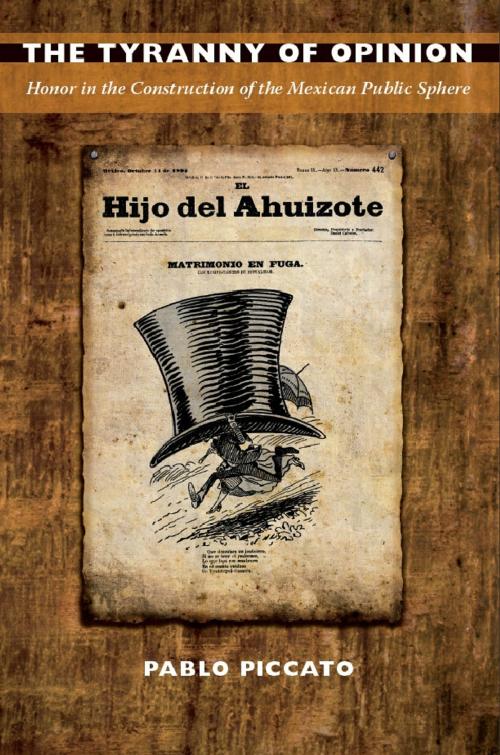The Tyranny of Opinion
Honor in the Construction of the Mexican Public Sphere
Nonfiction, History, Americas, Mexico, Social & Cultural Studies, Social Science, Gender Studies| Author: | Pablo Piccato | ISBN: | 9780822391753 |
| Publisher: | Duke University Press | Publication: | January 11, 2010 |
| Imprint: | Duke University Press Books | Language: | English |
| Author: | Pablo Piccato |
| ISBN: | 9780822391753 |
| Publisher: | Duke University Press |
| Publication: | January 11, 2010 |
| Imprint: | Duke University Press Books |
| Language: | English |
In the mid-to-late nineteenth century, as Mexico emerged out of decades of civil war and foreign invasion, a modern notion of honor—of one’s reputation and self-worth—became the keystone in the construction of public culture. Mexicans gave great symbolic, social, and material value to honor. Only honorable men could speak in the name of the public. Honor earned these men, and a few women, support and credit, and gave civilian politicians a claim to authority after an era dominated by military heroism.
Tracing how notions of honor changed in nineteenth-century Mexico, Pablo Piccato examines legislation, journalism, parliamentary debates, criminal defamation cases, personal stories, urban protests, and the rise and decline of dueling in the 1890s. He highlights the centrality of notions of honor to debates over the nature of Mexican liberalism, describing how honor helped to define the boundaries between public and private life; balance competing claims of free speech, public opinion, and the protection of individual reputations; and motivate politicians, writers, and other men to enter public life. As Piccato explains, under the authoritarian rule of Porfirio Díaz, the state became more active in the protection of individual reputations. It implemented new restrictions on the press. This did not prevent people from all walks of life from defending their honor and reputations, whether in court or through violence. The Tyranny of Opinion is a major contribution to a new understanding of Mexican political history and the evolution of Mexican civil society.
In the mid-to-late nineteenth century, as Mexico emerged out of decades of civil war and foreign invasion, a modern notion of honor—of one’s reputation and self-worth—became the keystone in the construction of public culture. Mexicans gave great symbolic, social, and material value to honor. Only honorable men could speak in the name of the public. Honor earned these men, and a few women, support and credit, and gave civilian politicians a claim to authority after an era dominated by military heroism.
Tracing how notions of honor changed in nineteenth-century Mexico, Pablo Piccato examines legislation, journalism, parliamentary debates, criminal defamation cases, personal stories, urban protests, and the rise and decline of dueling in the 1890s. He highlights the centrality of notions of honor to debates over the nature of Mexican liberalism, describing how honor helped to define the boundaries between public and private life; balance competing claims of free speech, public opinion, and the protection of individual reputations; and motivate politicians, writers, and other men to enter public life. As Piccato explains, under the authoritarian rule of Porfirio Díaz, the state became more active in the protection of individual reputations. It implemented new restrictions on the press. This did not prevent people from all walks of life from defending their honor and reputations, whether in court or through violence. The Tyranny of Opinion is a major contribution to a new understanding of Mexican political history and the evolution of Mexican civil society.















